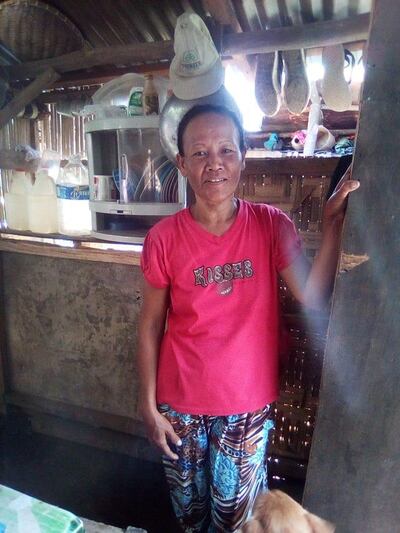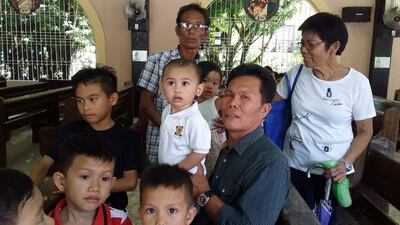For more than three months now, Dubai resident Lebeth Junaid has not been able to send money home to help support her family in the Philippines. She is not alone.
Since the Covid-19 outbreak earlier this year, the health pandemic has had a dramatic impact on the global workforce.
According to the World Bank, global remittances are projected to decline sharply by about 20 per cent in 2020.
The projected fall, which would be the sharpest decline in recent history, is largely due to a fall in the wages and employment of migrant workers.
In the UAE, many migrant workers have had their salaries reduced or been left unemployed due to the economic slowdown.
Others, like Dubai beautician Ms Junaid, have been put on long-term unpaid leave as a result of the crisis.
Before the pandemic, she would transfer a third of her Dh1,800 a month salary home to her mother who is looking after her two boys, aged 15 and two.
Since early March, the 33-year-old has been unable to remit even one dirham.
Her family, like many others who rely on their migrant relatives for support, said they are feeling the consequences.
"The last time she sent any money to us was in February," her mother, Lalaine Vistal, told The National from her home in Davao City in the south of the Philippines.
“Before the pandemic she would send us between 5,000 and 10,000 pesos (Dh350 to Dh750) a month.
“It has been very difficult for me because when the money stops, my income stops.
“Labeth is the only one supporting me because I am caring for her children, my grandsons.
“One of them is just two and he needs things like medicines, vitamins and milk.”
The 64-year-old said they received some government support in the Philippines, including kilo bags of rice, but the lack of money means it is hard to live a “decent life”.
“My daughter Lebeth has asked her stepfather’s family to lend us some money but we have borrowed too much now,” Ms Vistal said.

“When she starts her job again in Dubai she will have to pay the debt back and it is too much pressure for her.”
The United Nations estimates that 800 million people worldwide are supported by remittances.
Data from the World Bank shows remittance flows are expected to fall across all regions.
“Remittances are a vital source of income for developing countries. The ongoing economic recession caused by Covid-19 is taking a severe toll on the ability to send money home and makes it all the more vital that we shorten the time to recovery for advanced economies,” said World Bank Group President David Malpass in a media release.
With its majority expatriate population, the UAE is one of the highest outward remittance countries in the world.
Migrant workers from India, Pakistan and Nepal, among others, have families in their home countries who depend on them for financial support.
But over the last few months, the usually busy money exchange houses in the Emirates have seen few crowds flock to their premises due to the pandemic.
On the northern island of Luzon in the Philippines, Rafaela Tamayo said she is finding it hard to “adjust to life without financial support” from her son and daughter-in-law in Dubai.
Every month they would send home about Dh1,500 between them to pay for food, drink and other essentials for their two children who are in their mother’s care.
On March 17 that stopped when both were requested to go on unpaid leave by their employers.
Ms Tamayo, 64, said it is stressful trying to support her two grandchildren and husband, who is a double amputee, on “so little provisions”.

“It is difficult to feed the children when I have no income. I pray a lot,” said Ms Tamayo.
“My son and his wife have been in Dubai for 11 years working in restaurants and offices.
“I take care of their two children, they are seven and five, but this is the first time they have not been able to send money to support me.
“I feel depressed and stressed because I rely on them to take good care of us.”
She said the pandemic has caused “huge suffering” for the whole family. And while they have received some help from the local government and charities, it was not "sufficient enough" for their daily consumption.
In Zamboanga del Norte, a province south of the Philippines, Vic Quirante, 29, has been trying to support his parents since the outbreak.
Working as a fisherman in the Philippines, his income has dried up over the last few months due to funding issues.
Usually, his sister, who works as a salesperson in Dubai, sends home about Dh500 a month to their parents. But he said that routine came to a halt in early March due to the crisis.
“My sister Eve told us she was terminated from her company on March 11,” Mr Quirante said.
“My mother, she’s 66, is looking after Eve’s two sons but she is finding it very hard right now.
“My father is also a fisherman but work has stopped because there is too much rain in the Philippines now.
“My parents have no work, they need that money from my sister. The little money they do have they spend on rice and groceries for the children.
“If Eve doesn’t start working again in Dubai and can't send money soon, we will have a big problem.”


